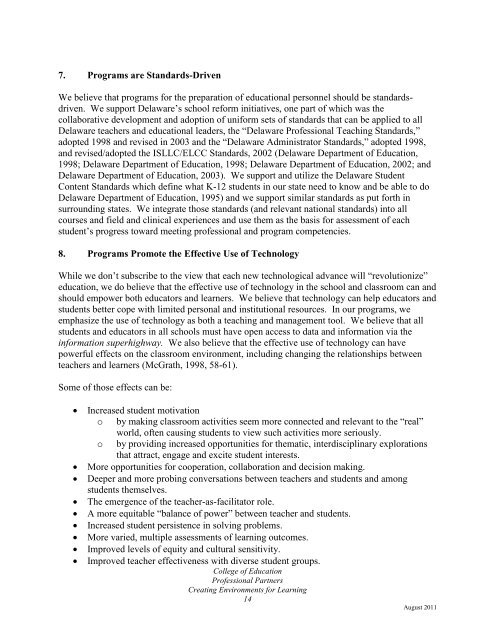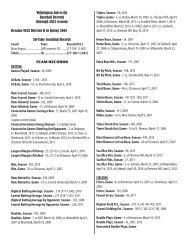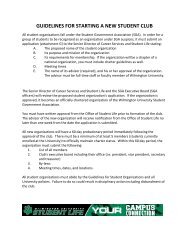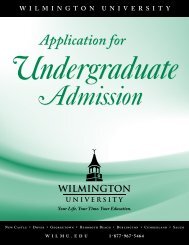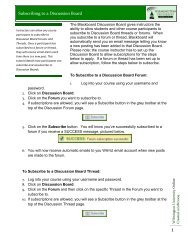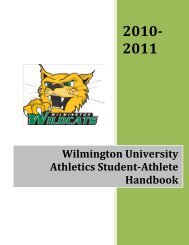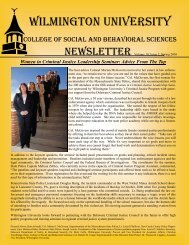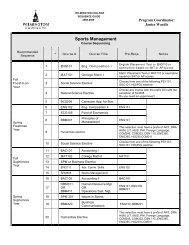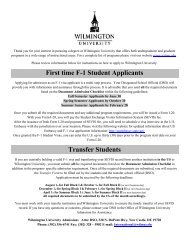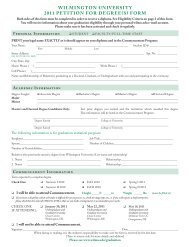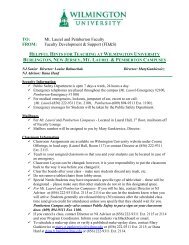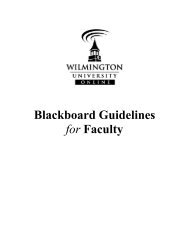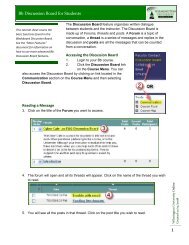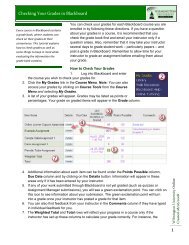handbook for cooperating teachers - Wilmington University
handbook for cooperating teachers - Wilmington University
handbook for cooperating teachers - Wilmington University
You also want an ePaper? Increase the reach of your titles
YUMPU automatically turns print PDFs into web optimized ePapers that Google loves.
7. Programs are Standards-DrivenWe believe that programs <strong>for</strong> the preparation of educational personnel should be standardsdriven.We support Delaware’s school re<strong>for</strong>m initiatives, one part of which was thecollaborative development and adoption of uni<strong>for</strong>m sets of standards that can be applied to allDelaware <strong>teachers</strong> and educational leaders, the “Delaware Professional Teaching Standards,”adopted 1998 and revised in 2003 and the “Delaware Administrator Standards,” adopted 1998,and revised/adopted the ISLLC/ELCC Standards, 2002 (Delaware Department of Education,1998; Delaware Department of Education, 1998; Delaware Department of Education, 2002; andDelaware Department of Education, 2003). We support and utilize the Delaware StudentContent Standards which define what K-12 students in our state need to know and be able to doDelaware Department of Education, 1995) and we support similar standards as put <strong>for</strong>th insurrounding states. We integrate those standards (and relevant national standards) into allcourses and field and clinical experiences and use them as the basis <strong>for</strong> assessment of eachstudent’s progress toward meeting professional and program competencies.8. Programs Promote the Effective Use of TechnologyWhile we don’t subscribe to the view that each new technological advance will “revolutionize”education, we do believe that the effective use of technology in the school and classroom can andshould empower both educators and learners. We believe that technology can help educators andstudents better cope with limited personal and institutional resources. In our programs, weemphasize the use of technology as both a teaching and management tool. We believe that allstudents and educators in all schools must have open access to data and in<strong>for</strong>mation via thein<strong>for</strong>mation superhighway. We also believe that the effective use of technology can havepowerful effects on the classroom environment, including changing the relationships between<strong>teachers</strong> and learners (McGrath, 1998, 58-61).Some of those effects can be:Increased student motivationo by making classroom activities seem more connected and relevant to the “real”world, often causing students to view such activities more seriously.o by providing increased opportunities <strong>for</strong> thematic, interdisciplinary explorationsthat attract, engage and excite student interests.More opportunities <strong>for</strong> cooperation, collaboration and decision making.Deeper and more probing conversations between <strong>teachers</strong> and students and amongstudents themselves.The emergence of the teacher-as-facilitator role.A more equitable “balance of power” between teacher and students.Increased student persistence in solving problems.More varied, multiple assessments of learning outcomes.Improved levels of equity and cultural sensitivity.Improved teacher effectiveness with diverse student groups.College of EducationProfessional PartnersCreating Environments <strong>for</strong> Learning14August 2011


